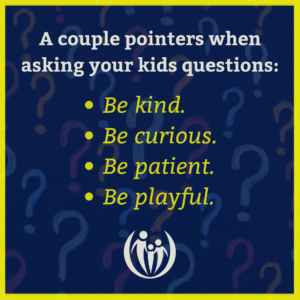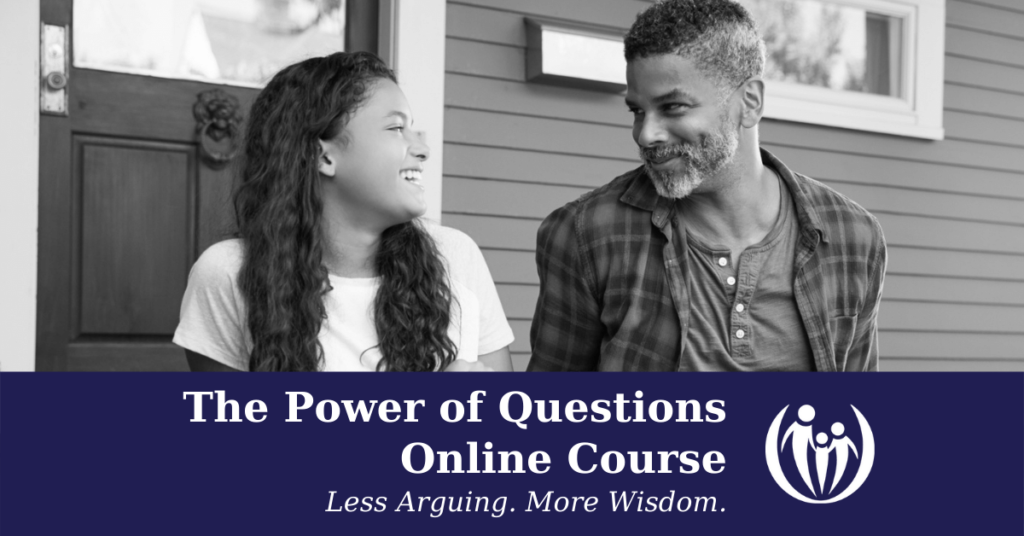
Asking vs. Telling: What Parents Need to Know About Questions & Learning

Are you asking or telling your kids what to do? I’m a teller by nature. It seems easier. Maybe it’s just more efficient. I tell my child what to do, and then she does it. I tell her the answer to her question, and she submissively accepts it: no (more) questions. Because in the lineup of asking vs. telling, telling wins in the efficiency category, hands down!
When we really consider the implications of this type of parent/child relationship, any short-term peace we might accomplish does not bring about the long-term life skills we desire.
What happens when you tell more often than you ask?
When we tell our kids to do routine tasks over and over again, we lose an excellent opportunity to help grow their capacity to think for themselves. Kids who are raised in a home with frequent directions and fewer questions may:
- Become dependent on others’ directives as they rely on other people to tell them what to do and when to do it.
- They miss the opportunity to develop critical thinking skills. When the “director” isn’t present, they don’t grow in their ability to look around and see what needs to happen.
- May even become conditioned to tune out their parents’ requests and demands.
And it’s not just about those all-important critical thinking skills. If your goal is for your kids to remember what you’re telling them, you may want to tell them less. In a study on the impact of asking questions on learning, students were put in three groups. The first group watched a video that stopped at various points. They were then asked questions to prompt a discussion in their small group and allow students to explain what they were learning. A second group watched the video with no prompts for discussion. The third group was the control group, which watched an entirely different video unrelated to the topic at hand. Then, all three groups read a text about the topic and answered questions about it. At first, no significant differences in recall were found. However…one month later, participants who had actively engaged in discussion remembered more from the text. The conclusion appears justified that those who initially participated in a discussion were positively affected in remembering key information.
In fact, here’s where parents should really pay attention: the group that just sat there and listened did not perform much better than the group that listened to an entirely unrelated topic after one month. Have you ever felt your words just weren’t sticking with your kids? Well, here’s evidence to back you up!
In contrast, when students explained what they were hearing and learning in their own words, they still remembered the content one month later!
In my years of coaching hundreds of parents, I’ve encouraged them to ask their kids questions to activate higher-level thinking.
Thankfully, there’s been a lot of research on this topic!
What’s the difference between telling and asking? And how do I know if I’m asking effectively?
Jack Wright, PhD, of The National Association for the Education of Young Children, states, “Asking children open-ended questions starts a conversation—and builds a relationship—and it even helps develop children’s brains. Asking them open-ended questions that help them think about how they want to behave, supports reflection, and increases self-control over time.”
Other research has shown that when asked probing questions or given the opportunity to explain their observations in discovery-based learning classrooms, children had better learning retention.
That’s a lot of positive outcomes, but how do you ask questions better? If you really want to master the art of asking instead of telling (and reap all those amazing learning benefits), read on for three ways to begin doing that.
1. Check your motivation first
Let’s say your child missed taking the garbage to the street, a job they know is theirs. The following day, you have three possible ways of handling this.
A. You launch into a lecture about responsibility and paying attention to what day of the week it is.
B. You ask your child in the morning. “Hey, do you know what day it is? And what day does the trash go out?” (Some questions are really just a parent’s clever way of telling.)
C. “Hey, Buddy, I’m pretty frustrated because we have so much trash. Are you aware of why that might be? Okay, how can we avoid this next week?”
Option B is better than Option A, and that deserves celebration. However, it still mainly points out the problem, which is just slightly better than telling your child there’s a problem. Option C moves into problem-solving, bringing you both onto the same team and inviting your child to come up with a solution.
Are you pointing out a problem, or are you inviting problem-solving? If you enter the moment knowing what answer they had better give you, it’s probably only slightly better than you just telling them.
2. Avoid sarcasm and condescension
You know those rhetorical questions vented in frustration? Most of us are guilty of asking them at times. For example, “You don’t know? How many times have I told you, and you still don’t know?” This type of question isn’t really looking for an answer. It’s simply an expression of disapproval, an attempt to trap a child into admitting failure.
3. Start from a place of curiosity
Stop and invite yourself to be genuinely curious. What do you know about this situation? Is there anything you’d really like to understand better about your child’s motivations? How can you ask from that place rather than a place of frustration? Good questions arise from curiosity and genuine interest in your child’s thoughts and experiences.
If you’re not feeling genuinely curious, even if what you say has a question mark at the end, you’ll tell your child what you want them to hear. But that’s not really asking your child for their input or developing critical thinking and problem-solving skills.
Free resource: “Ask a Curious Question”
We have a FREE downloadable resource for this topic! Check out “Ask a Curious Question.” Download it today to be equipped to have better conversations with kids.
Two practical examples of how you can move from telling to asking
Here are a few examples that might help you better incorporate questions into your daily routines:
What parents often tell kids: “Get ready for bed!”
You could ask instead:
- “What time is it?”
- “What usually happens at about this time?”
- What are all the things that need to happen to get to bed on time?
- What do you want to do first?
- What happens if you make it to bed on time?
Likely result of asking over time:
You get to affirm your child for responding well to your questions and acknowledge how responsible they are becoming. You can lovingly affirm their good choices and gently hold them accountable when things get off track.
What parents often tell kids: “Do your homework!”
You could ask instead:
- How are things looking for homework tonight?
- How long do you expect it to take?
- What’s on the calendar?
- Are there other things that are going on tonight that are important to you or others?
Likely result of asking over time:
You learn to hear your child’s perspective. The responsibility and time management of doing homework are placed primarily on your child. You help your child remember the expectations and consider what else may be on the family calendar for the evening.
Jesus set the example
Perhaps all this is why Jesus was famous for asking lots of questions—over 300 are recorded in scripture. He often responded to a question with another question. These 300 questions are a small glimpse of the thousands of questions that He probably asked.
In his book Jesus Is the Question, Martin Copenhaver claims that “Jesus was more than 40 times as likely to ask a question rather than answer one directly, and he was 20 times as likely to offer an indirect answer as a direct one.”
Jesus wanted people to internalize, process, and choose to respond to His teaching, not just repeat it back or follow blindly.
Asking vs. telling: It’s ultimately about long-term skills vs short-term peace
When I coach parents, I encourage them to have the long-term goal in mind. Questions are not a magic pill or quick fix that will turn your child into an expert at immediate obedience. When you begin asking more questions, you will likely be met with many “I don’t know” and shoulder shrugs. This approach will likely be new to your kids, and they may not know what to do with it, so expect some growing pains as they learn a new way of doing things!
Here are a couple of pointers when asking your kids questions:
- Be kind.
- Be curious.
- Be patient.
- Be playful.

Learn to ask more and tell less
Start with self-awareness. Over the next week, put some effort into noticing how much you tell vs. how much you ask. Have you found that you’ve been in a rut with directions and demands? Consider confessing to your kids if you’ve been impatient lately and that you’d like to change. Ask them if they have any suggestions about how you could help them be more responsible for themselves.
As your kids become confident in what is expected of them, they may begin to proactively take on more responsibility. The result over time? A greater sense of peace and connection in your home.
Watch this short (1:36) video of Chad talking more about asking questions vs telling.
© 2024, 2018 Connected Families
Do you feel like everything’s a fight? It’s exhausting, isn’t it? Check out our online course: The Power of Questions: Less Arguing. More Wisdom. This 4-session course will teach you how to stop arguing with your child and cultivate wisdom by asking thoughtful and curious questions.








